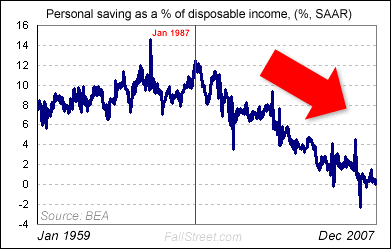|
February 4, 2008
The ‘successful’ modulation of business cycles?
“Today's Americans, their pain threshold lowered by the successful modulation of business cycles, now regard recessions as not mere misfortunes but as violations of an entitlement to perpetual economic serenity.”
How ‘successful’ the modulation of business cycles has been is, of course, open to interpretation. The article in question goes on to point out some interesting facts:
“That recession ended in November 1982. If another recession did start last month, then in the 302 months from November 1982 through December 2007, the economy was in recession only 14 months – 4.6 percent of the time. The economy was in recession 22.4 percent of the time between 1945 and 1982.”
Government manipulation of economic statistics notwithstanding, clearly something has happened over the last 25-years to make economic expansions much longer and recessions much shorter. One chart helps shed light on one potentially important trend:
 |
Along with consumer’s saving less money is the fact that traditional ‘savers’ became investors during this time period. Moreover, thanks to one of the greatest stock bulls in history (1982-2000) and the largest housing boom in history (2000-2006), these ‘investors’ produced spectacular returns (at least when observing historical ‘net worth’ trends). In other words, as any and all forms of ‘savings’ was erased in favor of immediate consumption and risky investments from 1982-2007 (risky investments meaning not guaranteed), the traditional ‘business cycle’ changed.
With these trends in mind, obviously the biggest near-term threat to GDP growth in the U.S. is that people actually start saving a few bucks. Such an occurrence would mean that people are less confident putting a higher percentage of their capital into equities and real estate, and likely also mean that they are less willing to take on additional debt. What would happen if U.S. consumers started saving say 8% of their income? Well, you would have to add approximately $810 billion to Bush’s stimulus package to make up for the consumer spending shortfall…
“A recession-free economy is neither an entitlement nor, truth be told, desirable: The “wisdom of crowds” is real but even markets make mistakes and recessions, aka corrections, are, by definition, constructive. Even so, the modern economy's rhythms are much less alarming than any previous generation could have imagined.”
What may be really ‘alarming’ to those out of the loop is learning that while the period from 1982-2007 was a magical time for many reasons, none of these reasons are even remotely sustainable. Using consumer savings/investing trends of the last 25-years, a small window into how 1-time capital shifts can dramatically alter the U.S. economy is seen. Needless to say, an ominous shadow is cast when closer investigation tells us that consumer liabilities growth outpaced asset growth during the time frame in question, and that the U.S. government’s financial position has deteriorated dramatically during this period, to say the least. In short, whether or not traditional business cycle forces have been ‘successfully’ mollified is open to interpretation.
|
